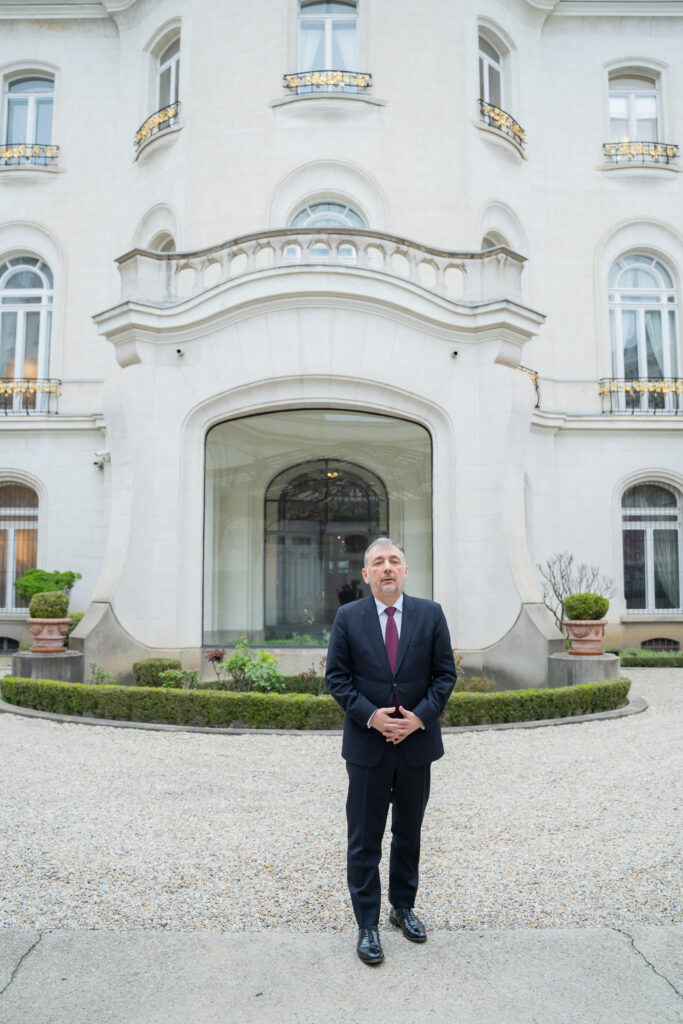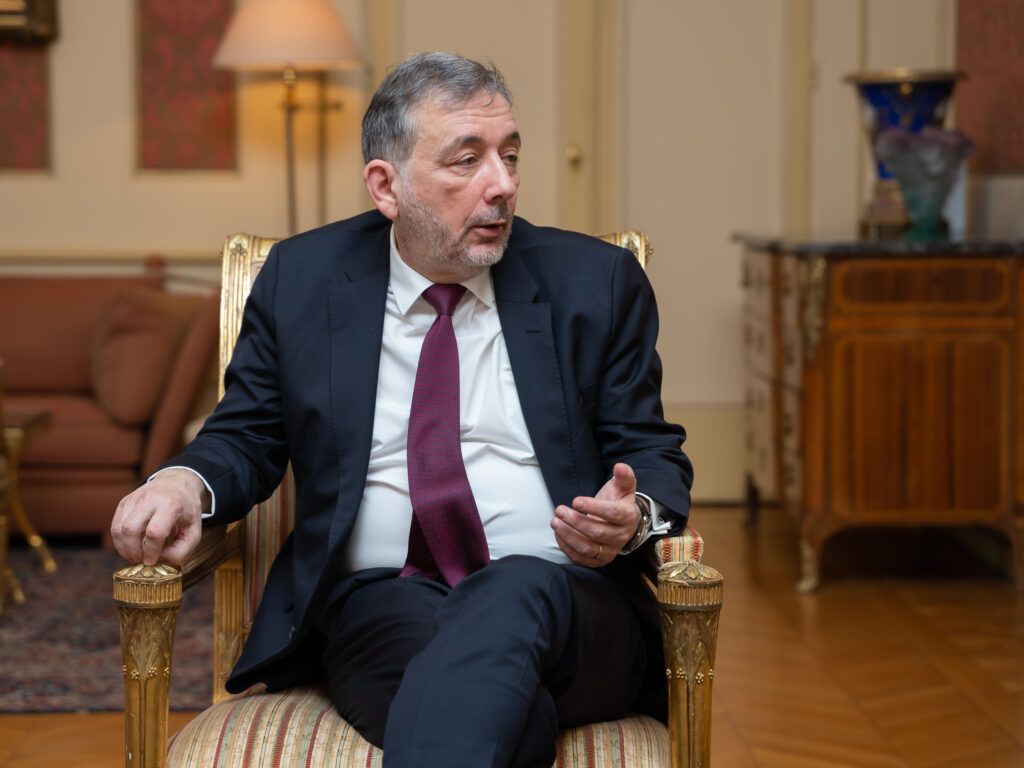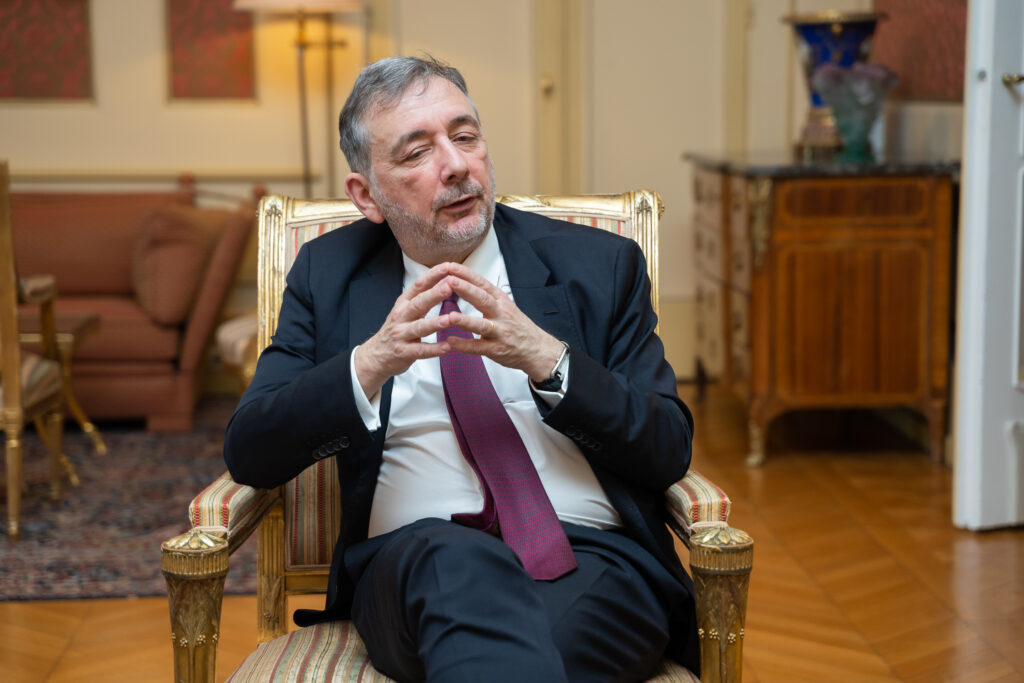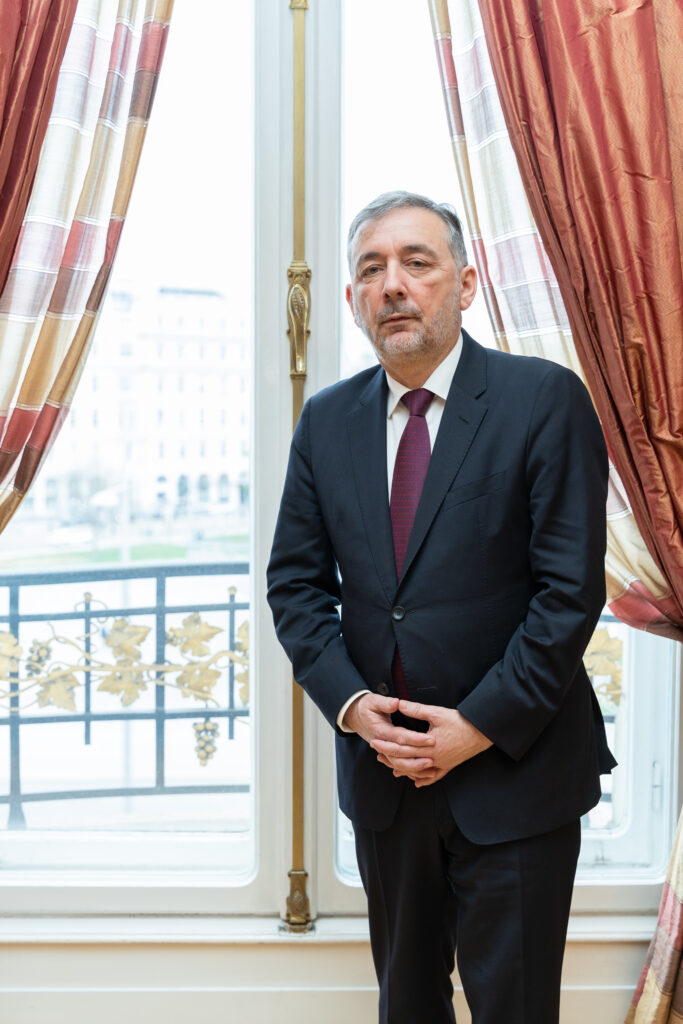SOCIETY spoke with the French Ambassador to Austria, H.E. Gilles Pécout, about the French presidency of the council of the EU, Europe’s role in Africa and the friendship between France and Austria.
The French programme of the presidency of the council of the European Union (January 1 to June 30, 2022) focuses on a “more sovereign Europe, a new European model for growth and a humane Europe”. How can these ambitions become reality?
Regarding the first point, I wish to underline that reinforcing our European sovereignty doesn’t mean that we are aiming at creating a European hegemony. It is simply of great importance to us Europeans to be united and to defend and spread our views and values, especially in times of global turmoil. The COVID-19 pandemic also shed new light on the economic dependency of our continent. In this regard, I recall the words of our Minister of Foreign Affairs: “It is not normal […] that Europe does not produce even one milligram of paracetamol”. During our presidency, we keep reaffirming that it is essential for Europe to be able to produce its own vital goods.

What is the adequate strategy to achieve this goal? In order to foster an economically stronger Europe, we are on our way to rebuild and reorganize our chains of value. With big investments in the chemical industry and other key economic sectors, we plan on achieving a thorough European reindustrialisation, always with our common interests in mind. Once again, a continent can be independent on the sole condition that it produces its own vital goods. To reach this goal, we need to increase our pace of adaptation to new standards, which are defined in our new European model for growth, aiming at reconciling economic growth with environmental transition and higher social standards like a minimum wage and gender equality, which, then again, are also important elements of our social agenda. The core principle of our initiative is to make Europe more humane and to strengthen our self-identity.
How would you define France’s role within the EU/the future of the EU? Where do you see the biggest challenges?
The ambition of our presidency is not to change the world but to take part in the process of building upon the many successes already achieved. It is not France’s role to define new developments for the EU but to provide its help and forces for this collective process. This, however, doesn’t prevent us from imagining new ideas and integrating them in our agenda, as it is the case with our social measures as well as our promotion of European sovereignty.
„We also have to continue to further develop peaceful and stable relations with the other continents.“
On February 17 and 18, 2022, the European Union-African Summit took place in Brussels under the motto “Renewing a Special Partnership”. Why is it important to “re-think” the relations between Europe and Africa? How could they look like?
Africa is an economically and historically important continent for Europe. Having good relations with the African Union is both part of the international agenda of our presidency and of our own priorities as an Embassy. H.E. Macky Sall was just appointed President of the African Union and he made a very positive comment about re-founding a new partnership between our continents. For example in the area of economic development, where Europe provides help to build infrastructure and encourages the mobility of a better educated labour force. In this regard, Europe can help rebuild educational systems – if deemed necessary by Africans – which would allow citizens from both continents to migrate to each other’s and join the local work force. This is our main priority, followed by our fight against terrorism, which is essential for geopolitical stability. We have to be able to respond to all these challenges together and within a balanced partnership.
What do these efforts involve?
Our agenda is about defining an economic and financial New Deal with Africa and accompanying Africa after the pandemic. Regarding health issues in the aftermath of the COVID-19 pandemic, Europe has been a pioneer since millions of doses have already been donate to Africa. During the last EU-AU summit, the EU member states agreed to donate 450 million doses by mid2022. We also plan to produce 60% of African vaccines on site. As RNA messenger vaccines are easier to manufacture and transport, a transfer of technology to several African countries is on its way to help in this effort. As President Macron said, vaccines are a common good and they should be available for everyone. In addition, Europe will significantly increase its investments in African infrastructures, particularly in the areas of transport and energy transition. Nearly €150 billion will be invested over the next six years as part of the „Global Gateway“, the European Union‘s new investment strategy. We also intend to make Africa peaceful and secure by supporting African efforts to combat terrorism, assisting peacekeeping operations and capacity building. Prevention through a better education, especially in high schools, also plays an important role here. Finally, we aim at promoting mobility and legal migration by combating smuggling and strengthening return and readmission mechanisms. Let us not forget about culture, which is often a blind spot in our relationship.

In the framework of its “Belt and Road Initiative”, China is investing heavily in the infrastructure sector of Africa. Is Europe trying to compete with China in this regard?
No, this is definitely not our aim. It is not Europe against China in Africa. However, as a union, we have to ensure to provide Africa with adequate and helpful resources and to build an equal, reciprocal and balanced relationship with its states. Politically speaking, this is not a matter of postcolonial thinking but rather a matter of helping Africa to foster continent-wide democracy. The democratic transitions have been difficult, because each country has its own policies. Certainly, Europe does not need to be completely present all the time but when we are asked to intervene and set an example for democratic values, we have to answer.
Europe is facing a new security challenge due to the Russian military aggression against Ukraine – from a historian’s point of view, how might this change the Europe we know?
What are the biggest challenges for the European Union? One of the biggest challenges is to face this crisis without forgetting the other priorities on our agenda. It is important to mention that the EU has never before shown such cohesion in
dealing with a situation that affects us all. Our president is one of the statesmen who is the most willing to interact with Vladimir Putin. History shows us that it is necessary to prepare for a post-war time with an open dialogue with Russia. It is interesting for Europe and France to see that even with different histories and experiences, our countries can agree on shared positions and values. For instance, the very respectable neutrality of Austria does not prevent a real commitment to human rights and European ethics. In a historical point of view, the evolution of the deeply-rooted Austrian neutrality is remarkable.
How would you describe the French-Austrian relations?
As bilateral Ambassador I can assert that the relationship between France and Austria is very good. Even though our economies are structured differently, our relationships in this field are successful. France is a great country of investment for Austria and our economic and political executive powers are in direct contact. Geopolitically speaking, there are many points of convergence between our countries, as well as some differences, partly because Austria is more tightly linked with the Balkans and their traditions. Firstly, as far as Austria’s neutrality is concerned, I reckon it is not really a matter of dogma, but rather a matter of historical identity. It however does not prevent us from sharing common positions and even less from fighting for our shared values. Then, our opinions differ on the question of nuclear energy. Austria is strongly opposed to use nuclear energy while France relies on it as a source of power. Despite those different views, we still agree on the need to decarbonize our economies. We also share a similar attachment to culture, education and arts. In France, we are working to increase our bilateral relationship in those fields and I have been appointed Ambassador to make sure the programs, mainly in science, university, education, culture and arts are flourishing. In this regard, a project is on its way to open a French business school in Austria, which would enable students to get a quality education in science and business and later give them the best opportunities to find a suitable job. Our agenda for the youth is to train, to educate, to promote research and humanities and to offer the best opportunities to network. Austrian Alumni would have the possibility to go to France and vice versa. The key notion of this project is mobility that enables gaining knowledge and experience. France is a great country of investment for Austria and our economic and political executive powers are in direct contact.
Fotos: SOCIETY/Karakan






















































































